During Soviet times, the Georgian town of Tskaltubo was renowned for its slightly radioactive springs, that were believed to have medicinal powers.
The town was once home to 16 sanatoriums and 23 springs, many of which were frequented by the Soviet elite, including Stalin himself.
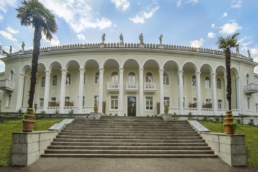
The sanatoriums were each dedicated to different types of workers, and targeted health problems specific to each industry. Among them was a spa for miners that specialised in physiotherapy, and another for steelworkers that helped with musculoskeletal diseases. There was even a resort built exclusively for the KGB.
At the height of Tskaltubo’s popularity, the sanatoriums would accommodate up to 5,742 people, but today, only a handful of them remain.
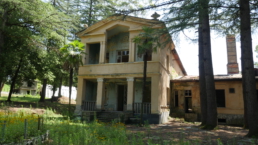
Tskaltubo Spa Restort, a grand hotel that fuses together classical Stanlinist architecture with Gothic and Roman features, is one of the only fully operational sanatoriums that remains in the area today.
“If you look at the complex from above, you will see the building is actually in the shape of an anchor – that’s because it was built for the navy, but later it served all members of the military”, explains Luiza Chakvetadze, the hotel’s manager.
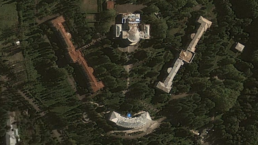
Leading the way up a grand marble staircase, passing the Mediterranean balconies that overlooked the pool, it wasn’t difficult to see why efforts had been made to preserve the hotel, which was one of the most luxurious in Tskaltubo. According to Luiza, “You had to be pretty high up in the ranks to stay at this resort”.
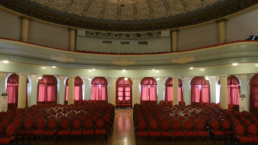
Shock Therapy
Originally opened in 1947, the resort is home to an impressive stucco-ceilinged theatre, and a grand dining area that would host some of the Soviet military’s top-ranking officials. The hotel is one of the largest in Tskaltubo, and back in the day, hosted up to 550 guests. However, after the break-up of the Soviet Union, the number of visitors plummeted.
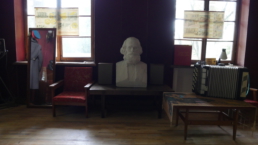
The fall of the Iron Curtain played a significant role in the decimation of spa towns around the USSR. As economic turbulence ensued during the transition to a market economy, the state-owned medical tourism industry dwindled. “There used to be a train that ran directly from Moscow several times a week”, Luiza explains. But after over two decades of independence, transport links that used to bring thousands of visitors from all over the Eastern Bloc have eroded and been severed off altogether.
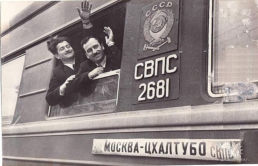
Transit Issues
It isn’t just trans-national links that are an issue. Due to the poor state of Georgia’s infrastructure — in particular its roads — getting there, even from the nearest domestic airport can be a hassle
Luiza recalls how last winter, during heavy snowfall, flights in the region were cancelled and an airline called up the hotel to see if they could accommodate stranded passengers.
“They wanted us to accommodate 150 people during winter season sometimes we have as little as five guests -— so this was a big surprise for us. We made the preparations, called our chef, the waiters and waitresses and took on extra staff. The next day when they were due to arrive, they couldn’t get here — because the roads were so bad! Obviously we laugh about it today, but these infrastructural problems can’t be ignored.”
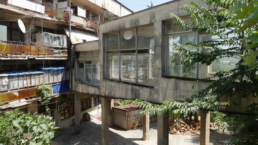
The surrounding spas are no stranger to hosting those in need of emergency accommodation. In fact, no less than 22 of the former resorts now house 6,000 of those who have been internally displaced from the Abkhazian conflict. But funding for the maintenance and consequential transition of these resorts into accommodation has been tight.
One winter, the displaced were forced to burn the antique parquet floors of one resort just to keep warm. As a result of such incidents, many fear for the future of these historical buildings, which are falling into further disrepair.
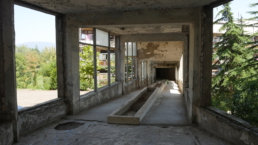
On the Up
While political change may have left Tskaltubo in an undoubtedly misfortunate position, its luck may be set to change. Last year, budget airline Wizzair launched direct flights from London and Berlin to the city of Kutaisi, which is just 8km away.
According to Luiza, “It’s already making a significant impact which is why we’re trying to expand our facilities here in order to encourage people to stay. We opened a bar, and a billiard room, but we are looking for other ways to provide entertainment. There isn’t that much to do in Tskaltubo itself — it doesn’t even have a cinema!”
It could be questionable as to whether a cinema is essential for those visiting the place. The whole town is a museum in itself. In the centre, many statues and Soviet memorials remain intact. There are a handful of traditional Georgian cafes and a number of make-shift market stalls sporadically dotted around the town.
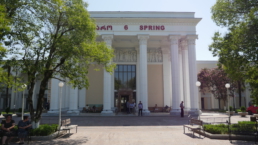
Spas of today
One of the few bathhouses that remain today contains a pool used by Georgian native Josef Stalin. It is believed that he would bathe in the radon-infused waters to treat his left arm, which was slightly deformed by a cart accident in his youth.
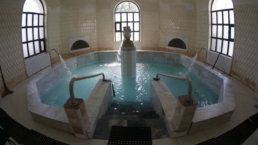
A huge frieze of the leader is placed at the front of the building. Grand columns line the foyer of the spa, which retains its soviet name – Bathhouse N.6. The baths inside are luxurious. Porcelain figures stand on an island in the middle of one, decorative mosaics line the bottom of another. Many of them are decked in marble. I was shown a coffin-like bath that Stalin’s secret police chief Beria used to bathe. Like many of the facilities in the complex, it had recently been restored.
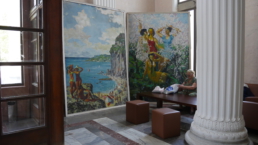
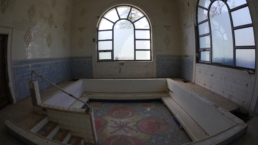
New Business
Offering a range of medical treatments, the main demographic of visitors are in their mid-50s upwards.
According to Luiza, Israeli tourism has breathed new life into the town’s spa industry. “They come here on heritage tours” she explains.
Georgia is home to one of the oldest surviving Jewish communities in the world. In the 1970s, around 80,000 resided in the country, but after the fall of the Soviet Union, most of them left and emigrated to Israel.
According to Luiza, “they come here to see the graves of their ancestors, or where relatives once used to live. They seek a biographical connection”.
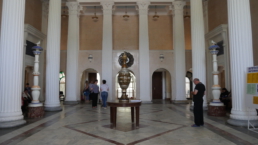
The manager of Bathhouse N.6, also says that Israelis have brought a lot of business to the area. As many of the visitors are older and retired, they have savings. “They can afford to travel- they can afford the prices here, and stay for longer- usually for around a week”, she says.
The price of the resorts is another thing to take into account. Stays at Tskaltubo Spa Resort start at 80 euro a night, making it unaffordable for the average Georgian who pockets less than that in a week.
The hotel however has devised special rates for Georgians, charging in the national currency of lari instead of dollars, making it a third of the price. Other guests include visitors from Kazakhstan and Azerbaijan, many of whom still consider Tsktaltubo a prestigious destination due to its reputation during Soviet times.
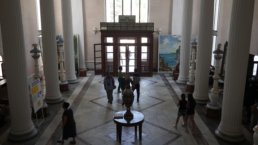
In October, billionaire businessman and former Prime Minister of Georgia Bidzina Ivanishvili announced that he had bought 22 hotels and 9 baths in Tskaltubo and aims to renovate them.
Ivanishvili , who is the Chairman of Georgian Dream-Democratic Georgia Party, claimed that the government lacks the funds to invest in the project, so decided to make the purchase himself, and that he would sell to potential investors at a discount price.
In a statement released on the party website, he says he wants to “give the government the stimulus to develop the infrastructure guaranteed by investments.”
The future of those staying in emergency accommodation is unclear.